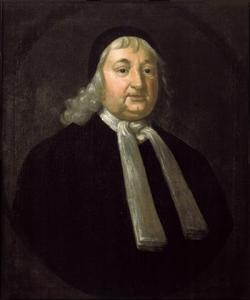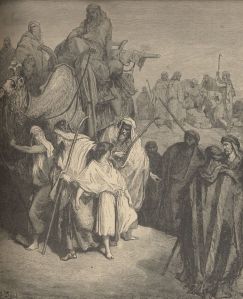From the Diary of Samuel Sewall 24 June 1700
June 24th was quite a day for Judge Samuel Sewall. Too many only recall his name in connection with the Salem Witch Trials. Sewall’s diary is packed full of essential and interesting colonial history.
Within entries relating to 24 June, his diary addresses not only the ship Charles, John Quelch, and the Trial of the Pirates, but also his publication of the seminal American abolitionist tract, The Selling of Joseph, on 24 June 1700.
Sewall’s diary indicates that, following a funeral, his thoughts turned to the issue of slavery. “Having been long and much dissatisfied,” he writes,
“With the Trade of fetching Negros from Guinea; at last I had a strong Inclination to Write something about it; but it wore off. At last-reading [Paul Bayne’s commentary on the Ephesians] about servants, who mentions Blackamoors; I began to be uneasy that I had so long neglected doing any thing. When I was thus thinking, in came Brother Belknap to shew me a Petition he intended to present to the General Court for the freeing of a Negro and his wife, who were unjustly held in Bondage.
“And there is a Motion by a Boston Committee to get a Law that all Importers of Negros shall pay 40s per head, to discourage the bringing of them. And Mr. C. Mather resolves to publish a sheet to exhort Masters to labour their Conversion. Which makes me hope that I was call’d of God to Write this Apology for them; Let his Blessing accompany the same.”
The Selling of Joseph clearly reveals Sewall’s mounting abhorrence of the slave trade. Citing passages from the Bible, he states his case; in the subsequent section of the tract, judge Sewall raises, and answers, hypothetical objections to his verdict condemning the practice of slavery.
Answering the objections, he inadvertently attests the prejudices of his era. Sewall was enlightened relative to his time, bold enough to condemn slavery, but the answers to his objections betray him as, regrettably, still a racist. One could argue that, just perhaps, Sewall, after first offering Biblical proof of the evils of slavery, proceeded to offer more practical, secular proofs of those evils, adopting something of the contemptible thought processes of the day solely for the sake of exposing their weakness and refuting them. Unfortunately, the supposition rings hollow, as soon as Sewall notes, “they can never embody with us, and grow up into orderly Families, to the Peopling of the Land.”
Although he condemned slave holders and traders, he would rather not have Blacks in Boston. Although an abolitionist, he remained a segregationist.
Nevertheless, The Selling of Joseph represents an essential element in the study of the abolitionist movements on US soil.
Sewall’s tract was, in part, inspired by a slave, Adam, who was held by John Saffin, one of Sewall’s legal colleagues in Boston and, like Sewall, a respected merchant. Unlike Sewall, Saffin trafficked in slaves; particularly galling to Sewall, Saffin reneged on a deal to manumit Adam. Sewall and Saffin argued over the issue. Sewall criticized Saffin in private, but Saffin went public and issued his defense of slavery in his A Brief Candid Answer to a Late Printed Sheet Entitled, The Selling of Joseph in 1701. The “Sewall-Saffin Dialog” represents the roots of the antebellum slavery debates in America.
The Selling of Joseph gets right to its point. Here is an excerpt, reformatted for enhanced web readability, but with few further textual alterations.
FORASMUCH as Liberty is in real value next unto Life: None ought to part with it themselves, or deprive others of it, but upon most mature Consideration.
The Numerousness of Slaves at this day in the Province, and the Uneasiness of them under their Slavery, hath put many upon thinking whether the Foundation of it be firmly and well laid; so as to sustain the Vast Weight that is built upon it.
It is most certain that all Men, as they are the Sons of Adam, are Coheirs; and have equal Right unto Liberty, and all other outward Comforts of Life.GOD hath given the Earth [with all its Commodities] unto the Sons of Adam, Psal 115. 16. And hath made of One Blood, all Nations of Men, for to dwell on all the face of the Earth; and hath determined the Times before appointed, and the bounds of their habitation: That they should seek the Lord. Forasmuch then as we are the Offspring of GOD &c. Act 17.26, 27, 29.
Now although the Title given by the last ADAM, doth infinitely better Mens Estates, respecting GOD and themselves; and grants them a most beneficial and inviolable Lease under the Broad Seal of Heaven, who were before only Tenants at Will: Yet through the Indulgence of GOD to our First Parents after the Fall, the outward Estate of all and every of the Children, remains the same, as to one another. So that Originally, and Naturally, there is no such thing as Slavery.
Joseph was rightfully no more a Slave to his Brethren, then they were to him: and they had no more Authority to Sell him, than they had to Slay him. And if they had nothing to do to Sell him; the Ishmaelites bargaining with them, and paying down Twenty pieces of Silver, could not make a Title. Neither could Potiphar have any better Interest in him than the Ishmaelites had. Gen. 37. 20, 27, 28.
For he that shall in this case plead Alteration of Property, seems to have forfeited a great part of his own claim to Humanity.
There is no proportion between Twenty Pieces of Silver, and LIBERTY. The Commodity it self is the Claimer. If Arabian Gold be imported in any quantities, most are afraid to meddle with it, though they might have it at easy rates; lest if it should have been wrongfully taken from the Owners, it should kindle a fire to the Consumption of their whole Estate.
’Tis pity there should be more Caution used in buying a Horse, or a little lifeless dust; than there is in purchasing Men and Women : Whenas they are the Offspring of GOD, and their Liberty is,
Auro pretiosior Omni.
And seeing GOD hath said, He that Stealeth a Man and Selleth him, or if he be found in his hand, he shall surely be put to Death. Exod. 12.16.
This Law being of Everlasting Equity, wherein Man Stealing is ranked amongst the most atrocious of Capital Crimes : What louder Cry can there be made of the Celebrated Warning,
Caveat Emptor !











